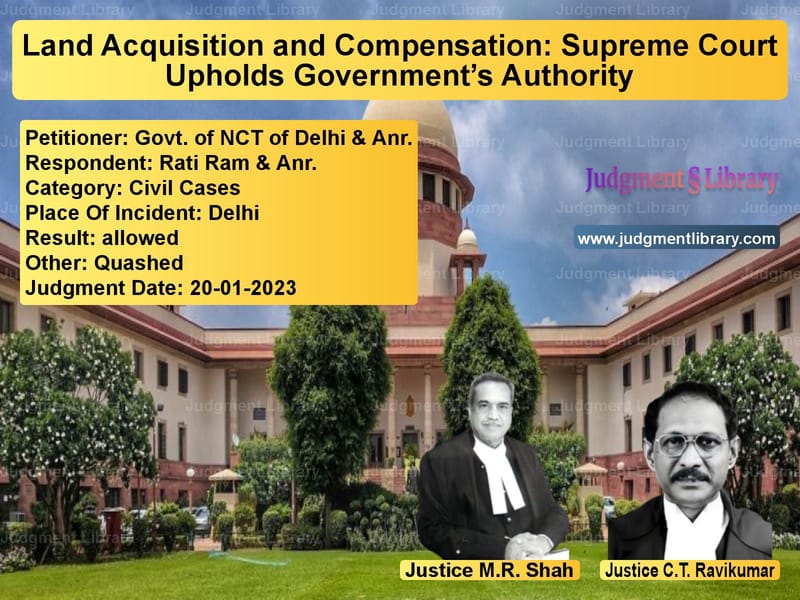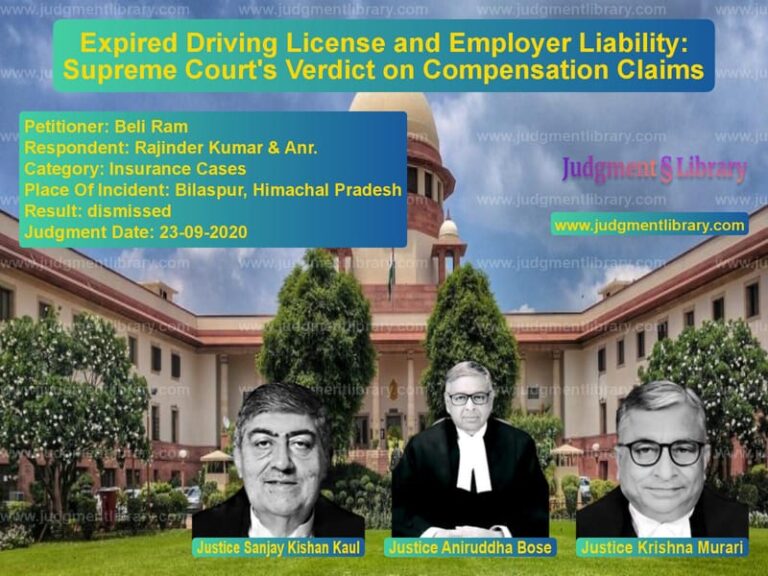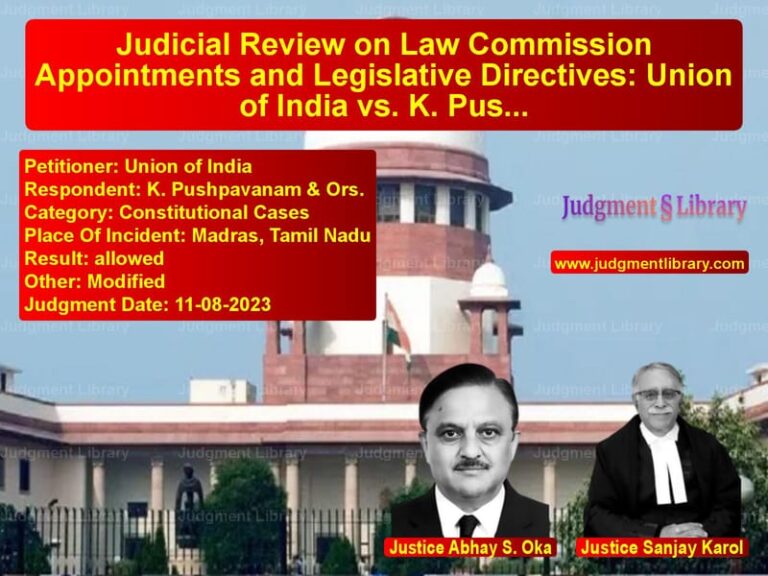Land Acquisition and Compensation: Supreme Court Upholds Government’s Authority
The case of Govt. of NCT of Delhi v. Sunil Jain & Ors. concerns the application of Section 24(2) of the Right to Fair Compensation and Transparency in Land Acquisition, Rehabilitation, and Resettlement Act, 2013. The Supreme Court was called upon to determine whether land acquisition proceedings had lapsed due to non-payment of compensation and whether subsequent purchasers had the right to challenge acquisition proceedings.
Background of the Case
The case arose when the Delhi High Court ruled in favor of landowners, declaring that the acquisition of their land had lapsed under Section 24(2) of the 2013 Act. The Government of NCT of Delhi challenged this decision before the Supreme Court, arguing that the High Court had erred in its application of the law.
The land acquisition process began under the Land Acquisition Act, 1894. The award was passed, but possession of the land could not be taken due to litigation. The original landowners later sold the land to subsequent purchasers, who then filed a writ petition seeking a declaration that the acquisition had lapsed.
Legal Issues Considered
The Supreme Court examined the following key legal questions:
- Whether subsequent purchasers had the locus standi to challenge the land acquisition.
- Whether acquisition lapses under Section 24(2) if possession was not taken due to pending litigation.
- Whether the High Court erred in relying on the overruled Pune Municipal Corporation judgment.
Arguments by the Appellants (Govt. of NCT of Delhi)
The government contended that:
- Subsequent purchasers have no right to challenge acquisition proceedings.
- Possession could not be taken due to litigation initiated by the original landowners, which should not be used as a ground to claim lapse.
- The High Court wrongly relied on the Pune Municipal Corporation case, which had been overruled by the Supreme Court’s Constitution Bench in Indore Development Authority.
- The acquisition remains valid under the law, and compensation must be determined under the applicable legal framework.
Arguments by the Respondents (Sunil Jain & Ors.)
The respondents, who were subsequent purchasers of the land, argued that:
- Since possession was not taken and compensation was not paid, the acquisition should be deemed lapsed under Section 24(2) of the 2013 Act.
- They had legally purchased the land and were entitled to challenge its acquisition.
- The High Court correctly applied the legal principles set out in earlier judgments.
Supreme Court’s Judgment
The Supreme Court ruled as follows:
- Subsequent purchasers have no right to challenge acquisition: The Court reiterated that buyers who acquire land after the issuance of an acquisition notification cannot claim its lapse.
- Acquisition does not lapse if possession was delayed due to litigation: The Court noted that possession was not taken due to legal challenges initiated by the landowners, and they could not now use this as a reason to claim lapse.
- High Court’s reliance on Pune Municipal Corporation was incorrect: The Court reaffirmed that the case had been overruled by Indore Development Authority, which clarified the conditions under which acquisition lapses.
- Acquisition remains valid: The Supreme Court overturned the High Court’s ruling and upheld the government’s right to acquire the land.
Analysis of the Judgment
The ruling establishes clear legal principles regarding land acquisition and prevents challenges by subsequent purchasers who buy land after acquisition proceedings have begun.
Implications for Landowners
- Original landowners cannot obstruct possession and later claim lapse of acquisition.
- Subsequent purchasers do not have the right to challenge acquisition proceedings.
- Compensation claims must be pursued through appropriate legal mechanisms.
Implications for the Government
- The ruling strengthens the government’s authority in land acquisition cases.
- Legal challenges from subsequent purchasers can no longer delay infrastructure projects.
- Authorities must ensure proper documentation to prevent disputes.
Implications for Future Land Acquisition Cases
- The judgment provides clear guidelines on the interpretation of Section 24(2).
- It prevents unnecessary litigation by reaffirming the government’s rights.
- Public projects will face fewer legal hurdles due to subsequent transactions.
Conclusion
The Supreme Court’s judgment in this case ensures that land acquisition proceedings are not undermined by subsequent sales and legal challenges. By clarifying the application of Section 24(2), the ruling reinforces the stability of land acquisition laws and ensures that infrastructure projects are not unduly delayed.
Petitioner Name: Govt. of NCT of Delhi.Respondent Name: Sunil Jain & Ors..Judgment By: Justice M.R. Shah, Justice C.T. Ravikumar.Place Of Incident: Delhi.Judgment Date: 13-01-2023.
Don’t miss out on the full details! Download the complete judgment in PDF format below and gain valuable insights instantly!
Download Judgment: govt.-of-nct-of-delh-vs-sunil-jain-&-ors.-supreme-court-of-india-judgment-dated-13-01-2023.pdf
Directly Download Judgment: Directly download this Judgment
See all petitions in Property Disputes
See all petitions in Public Interest Litigation
See all petitions in Judgment by Mukeshkumar Rasikbhai Shah
See all petitions in Judgment by C.T. Ravikumar
See all petitions in allowed
See all petitions in Quashed
See all petitions in supreme court of India judgments January 2023
See all petitions in 2023 judgments
See all posts in Civil Cases Category
See all allowed petitions in Civil Cases Category
See all Dismissed petitions in Civil Cases Category
See all partially allowed petitions in Civil Cases Category







